新概念第一册课文翻译及学习笔记:Lesson3
新概念英语第一册课文翻译及学习笔记
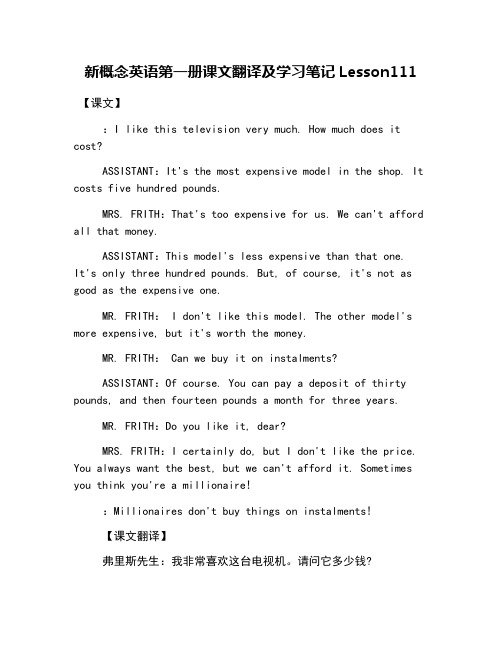
新概念英语第一册课文翻译及学习笔记Lesson111【课文】:I like this television very much. How much does it cost?ASSISTANT:It's the most expensive model in the shop. It costs five hundred pounds.MRS. FRITH:That's too expensive for us. We can't afford all that money.ASSISTANT:This model's less expensive than that one.It's only three hundred pounds. But, of course, it's not as good as the expensive one.MR. FRITH: I don't like this model. The other model's more expensive, but it's worth the money.MR. FRITH: Can we buy it on instalments?ASSISTANT:Of course. You can pay a deposit of thirty pounds, and then fourteen pounds a month for three years.MR. FRITH:Do you like it, dear?MRS. FRITH:I certainly do, but I don't like the price. You always want the best, but we can't afford it. Sometimes you think you're a millionaire!:Millionaires don't buy things on instalments!【课文翻译】弗里斯先生:我非常喜欢这台电视机。
新概念英语第一册课后习题及答案:Lesson3-4
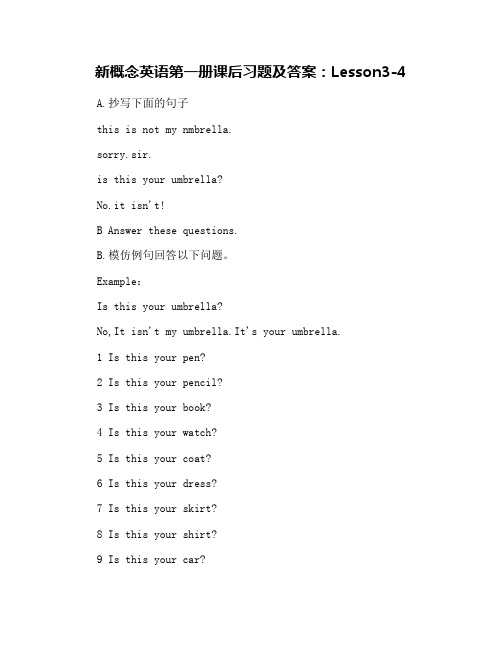
新概念英语第一册课后习题及答案:Lesson3-4 A.抄写下面的句子this is not my nmbrella.sorry.sir.is this your umbrella?No.it isn't!B Answer these questions.B.模仿例句回答以下问题。
Example:Is this your umbrella?No,It isn't my umbrella.It's your umbrella.1 Is this your pen?2 Is this your pencil?3 Is this your book?4 Is this your watch?5 Is this your coat?6 Is this your dress?7 Is this your skirt?8 Is this your shirt?9 Is this your car?10 Is this your house?答案:Lesson 4B1 No. It isn't my pen. It's your pen.2 No. It isn't my pencil. It's your pencil.3 No. It isn't my book. It's your book.4 No. It isn't my watch. It's your watch.5 No. It isn't my coat. It's your coat.6 No. It isn't my dress. It's your dress.7 No. It isn't my skirt. It's your skirt.8 No. It isn't my shirt. It's your shirt.9 No. It isn't my car. It's your car.10 No. It isn't my house. It's your house.。
新概念英语第一册课文翻译及学习笔记Lesson21_26
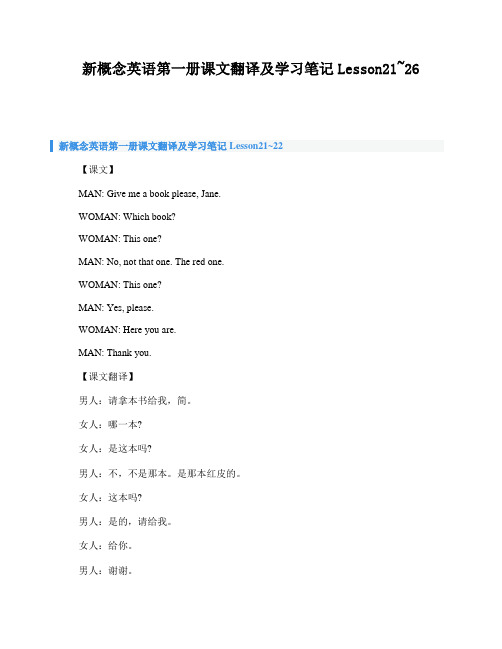
新概念英语第一册课文翻译及学习笔记Lesson21~26新概念英语第一册课文翻译及学习笔记Lesson21~22【课文】MAN: Give me a book please, Jane.WOMAN: Which book?WOMAN: This one?MAN: No, not that one. The red one.WOMAN: This one?MAN: Yes, please.WOMAN: Here you are.MAN: Thank you.【课文翻译】男人:请拿本书给我,简。
女人:哪一本?女人:是这本吗?男人:不,不是那本。
是那本红皮的。
女人:这本吗?男人:是的,请给我。
女人:给你。
男人:谢谢。
【生词】give v. 给one pron.一个which question word 哪一个【知识点讲解】1. 今天我们来学习一种新的句型:祈使句,Imperative Sentence 。
用于表达命令、请求、劝告、警告、禁止等的句子叫做祈使句。
祈使句的主语一般都省略,直接用动词原形开头。
比如课文中的:Give me a book please. 这里如果用完整的表达是You give a book please. 但除非是要强调You,一般很少这么表达。
再举几个例子:Be quiet, please. 或 Please be quiet. ——请安静。
在祈使句中please放在句首句尾都是可以的。
这里可以看到用到的是be动词原形。
Sit down, please. ——请坐下。
Look out! 或 Watch out! ——小心!2. which这个疑问词我们之前提到过,表示对确切物体的询问。
which和what的区别是:前者用于选择范围较小或较明确的场合,后者用于选择范围较大或不明确的场合。
比如:Which color is your car, black or white? 你的车是什么颜色?黑色或白色?(确切地在黑与白中间提问)What color is your car? 你的车是什么颜色的?(不确定是什么颜色,没有限制)另外课文当中的which one是which book的省略。
新概念英语第一册课文翻译及学习笔记Lesson63~68

新概念英语第一册课文翻译及学习笔记Lesson63~68【导语】为了方便同学们的学习,为您精心整理了“新概念英语第一册课文翻译及学习笔记Lesson63~68”,希望有了这些内容的帮助,可以为大家学习新概念英语提供帮助!如果您想要了解更多新概念英语的相关内容,就请关注吧!新概念英语第一册课文翻译及学习笔记Lesson63~64 【课文】DOCTOR: How’s Jimmy today?MRS. WILLIAMAS: Better. Thank you, Doctor.DOCTOR: Can I see him please, Mrs. Williams?MRS. WILLIAMS: Certainly, doctor. Come upstairs.DOCTOR: You look very well, Jimmy. You are better now, but you mustn’t get up yet. You must stay in bed for another two days.DOCTOR: The boy mustn’t go to school yet, Mrs. Williams. And he mustn’t eat rich food.MRS. WILLIAMS: Does he have a temperature, doctor?DOCTOR: No, he doesn’t.MRS. WILLIAMS: Must he stay in bed?DOCTOR: Yes. He must remain in bed for another twodays. He can get up for about two hours each day, but you must keep the room warm.DOCTOR: Where’s Mr. Williams this evening?MRS. WILLIAMS: He’s in bed, doctor. Can you see him please? He has a bad cold, too!【课文翻译】医生:吉米今天怎么样了?威廉斯夫人:他好些了。
新概念英语第一册课文翻译及学习笔记Lesson27~32(最新)
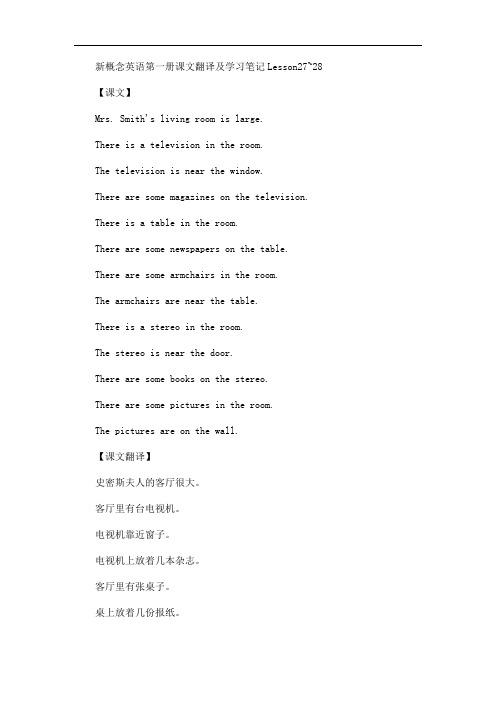
新概念英语第一册课文翻译及学习笔记Lesson27~28 【课文】Mrs. Smith's living room is large.There is a television in the room.The television is near the window.There are some magazines on the television. There is a table in the room.There are some newspapers on the table.There are some armchairs in the room.The armchairs are near the table.There is a stereo in the room.The stereo is near the door.There are some books on the stereo.There are some pictures in the room.The pictures are on the wall.【课文翻译】史密斯夫人的客厅很大。
客厅里有台电视机。
电视机靠近窗子。
电视机上放着几本杂志。
客厅里有张桌子。
桌上放着几份报纸。
客厅里有几把扶手椅。
这些扶手椅靠近桌子。
客厅里有台立体声音响。
音响靠近门。
音响上面有几本书。
客厅里有几幅画。
画挂在墙上。
【生词】living room 客厅near prep.靠近window n. 窗户armchair n. 扶手椅door n. 门picture n. 图画wall n. 墙【知识点讲解】1. 今天我们要继续学习和方位有关的表达方式。
文中提到:near sth. 靠近某物;on the wall,在墙上。
注意这里的介词用的是on,如果是in the wall 的话,那么意思就是“镶在墙里面”。
on和in这两个介词的意思,前者是在……之上,后者是在……里面,一般没有什么异议。
新概念英语第一册课文翻译及学习笔记Lesson129~134
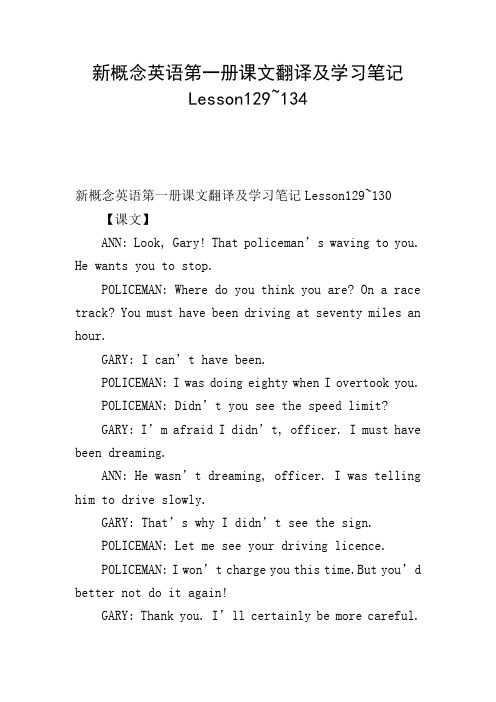
新概念英语第一册课文翻译及学习笔记Lesson129~134新概念英语第一册课文翻译及学习笔记Lesson129~130 【课文】ANN: Look, Gary! That policeman’s waving to you. He wants you to stop.POLICEMAN: Where do you think you are? On a race track? You must have been driving at seventy miles an hour.GARY: I can’t have been.POLICEMAN: I was doing eighty when I overtook you.POLICEMAN: Didn’t you see the speed limit?GARY: I’m afraid I didn’t, officer. I must have been dreaming.ANN: He wasn’t dreaming, officer. I was telling him to drive slowly.GARY: That’s why I didn’t see the sign.POLICEMAN: Let me see your driving licence.POLICEMAN: I won’t charge you this time.But you’d better not do it again!GARY: Thank you. I’ll certainly be more careful.ANN: I told you to drive slowly, Gary.GARY: You always tell me to drive slowly, darling.ANN: Well, next time you’d better take my advice!【课文翻译】安:瞧,加里!那个警察正朝你挥手呢。
新概念英语第一册Lesson93~98课文翻译及学习笔记(最新)

新概念英语第一册Lesson93~94课文翻译及学习笔记【课文】Nigel is our new next-door neighbour. He's a pilot.He was in the R.A.F.He will fly to New York next month.The month after next he'll fly to Tokyo.At the moment, he's in Madrid. He flew to Spain a week ago.He'll return to London the week after next.He's only forty-one years old, and he has already been to nearly every country in the world.Nigel is a very lucky man. But his wife isn't very lucky. She usually stays at home!【课文翻译】奈杰尔是我们新搬来的隔壁邻居。
他是个飞行员。
他曾在皇家空军任职。
下个月他将飞往纽约。
再下个月他将飞往东京。
现在他在马德里。
他是一星期以前飞到西班牙的。
再下个星期他将返回伦敦。
他只有41岁,但他却去过世界上几乎每一个国家。
奈杰尔是个很幸运的人。
但他的妻子运气不很好。
她总是呆在家里!【生词】pilot n. 飞行员return v. 返回New York n. 纽约Tokyo n. 东京Madrid n. 马德里fly (flew, flown) v. 飞行【知识点讲解】1. next-door neighbour 意思是隔壁邻居。
2. R.A.F 是 the Royal Air Force 英国皇家空军的简写;3. next month, 下个月;the month after next,下下个月;the week after next,下下周。
新概念英语第一册Lesson123~128课文翻译及学习笔记

【导语】学习新概念英语并不难啊。
你还在为英语成绩低拖后腿⽽烦恼吗?不要着急,⼩编为⼤家提供了“新概念英语第⼀册Lesson123~128课⽂翻译及学习笔记”。
相信加⼊学习当中的你,很快便不再受英语的困扰!还在等什么?和⼩编⼀起来学习吧!新概念英语第⼀册Lesson123~124课⽂翻译及学习笔记 【课⽂】 MIKE: Look, Scott. This is a photograph I took during my trip to Australia. SCOTT: Let me see it, Mike. SCOTT: This is a good photograph. Who are these people? MIKE: They're people I met during the trip. MIKE: That's the ship we travelled on. SCOTT: What a beautiful ship! SCOTT: Who's this? MIKE: That's the man I told you about.Remember? SCOTT: Ah yes. The one who offered you a job in Australia. MIKE: That's right. SCOTT: Who's this? MIKE: Guess! SCOTT: It's not you, is it? MIKE: That's right. MIKE: I grew a beard during the trip, but I shaved it off when I came home. SCOTT: Why did you shave it off? MIKE: My wife didn't like it! 【课⽂翻译】 迈克:看,这是我到澳⼤利来旅⾏时拍的⼀张照⽚。
- 1、下载文档前请自行甄别文档内容的完整性,平台不提供额外的编辑、内容补充、找答案等附加服务。
- 2、"仅部分预览"的文档,不可在线预览部分如存在完整性等问题,可反馈申请退款(可完整预览的文档不适用该条件!)。
- 3、如文档侵犯您的权益,请联系客服反馈,我们会尽快为您处理(人工客服工作时间:9:00-18:30)。
新概念第一册课文翻译及学习笔记:Lesson3 My coat and my umbrella please.
Here is my ticket.
Thank you, sir.
Number five.
Here's your umbrella and your coat.
This is not my umbrella.
Sorry sir.
Is this your umbrella?
No, it isn't.
Is this it?
Yes, it is.
Thank you very much.
【课文翻译】
请把我的大衣和伞拿给我。
这是我(寄存东西)的牌子。
谢谢,先生。
是5号。
这是您的伞和大衣
这不是我的伞。
对不起,先生。
这把伞是您的吗?
不,不是!
这把是吗?
是,是这把。
非常感谢。
【生词】
umbrella n. 伞
please int. 请
here adv. 这里
my possessive adjective 我的
ticket n. 票
number n. 号码
five num. 五
sorry adj. 对不起的
sir n. 先生
cloakroom n. 衣帽存放处
【知识点讲解】
1. "here is sth." 是把东西递给别人时的说法。
这种时候也能够说“Here it is.”(如果东西是单数), "Here they are."(如果是复数), "Here you are."(单复数皆可)
2. 上一课中我们学到过 This is...的句型,以及它的疑问句形式Is this...? 今天我们再来学习一个否定的句法:This is not...
e.g This is not a request. This is an order!
这不是一个请求,这是命令!
3. 英语的数字1-10分别是:one, two, three, four, five, six, seven, eight, nine, ten.。
